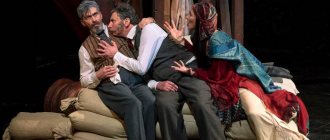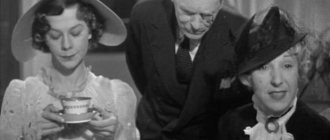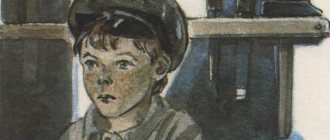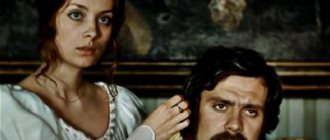The middle of the 19th century was the most fruitful period in Russian literature, including drama. One of the famous representatives of the “golden age” is A. N. Ostrovsky. In his works he described the life of the philistinism, merchants and nobility of that time. An analysis of the play “Our People - Let's Be Numbered” will be useful for schoolchildren in the 10th grade when preparing to write an essay.
History of creation
“We Will Be Numbered as Our Own People” is the author’s first serious work, which was written in 1849. The writer worked hard on the play for 3 years, and its title changed throughout the creative process: “Bankrupt”, “Insolvent Debtor”, but Ostrovsky’s final version chose the title “Our People—We Will Be Numbered.”
The work was first published in 1850 in the newspaper Moskvityanin. Aphorism of speech, brightness of images, realism - this is what attracted contemporaries to Ostrovsky’s first comedy. Moreover, the appearance of this play caused enormous excitement in literary circles, since Alexander Nikolaevich described the current problems of society of that time in an ironic form. It is quite logical that censorship completely banned this work, and the writer was then under secret police surveillance.
The production of the play was allowed only after the death of Tsar Nicholas I in 1859, but with the condition of a “softer” version. The comedy was fully presented in its original version only in 1881.
At one time, illustrations for the book were made by the artist Vladimir Aleksandrovich Tronov and academician Andrei Dmitrievich Goncharov, while the latter made drawings for Ostrovsky’s plays throughout his entire career, developing this theme.
Genre and composition
The play is in the direction of realism. In it, Ostrovsky tried to most reliably show the surrounding reality of that time. The images created by the author, the thoughts of the main characters, their quotes and actions look very natural. The reader begins to easily believe that the events indicated in the work actually happened. Separately, it is necessary to highlight the literary language of the play: in it one can find undisguised and lively flattering speeches of the merchants.
The play was specially created for production on the theater stage. Ostrovsky used a humorous approach to expose social and human vices. The work is full of many comical settings and situations. For example, Lipochka boasts of her refined manners despite their absolute absence, the matchmaker changes his own opinion every five minutes, and the lawyer constantly asks for a drink in important episodes of the conversation.
The play has a classical composition and has four acts:
- An exposition where the reader is presented with a description of the main characters and background, as well as a plot in which the main conflict is outlined and further developed.
- The climax is where the conflict reaches its climax.
- The denouement is where the conflict logically ends.
- The finale brings all the storylines to a conclusion and sums up the entire play.
At the heart of the work is the conflict of an immoral person with society and directly with fate; his confrontation is initially doomed to defeat. Another feature of the presented conflict situation is its ambiguity and moral mediocrity; the reader cannot clearly identify negative and positive characters; they all have their own advantages and disadvantages.
The title of the play itself is pronounced once in the work itself; this catchphrase briefly describes the social situation with clannishness, corruption and nepotism prevailing in society, which is what Ostrovsky tried to show.
But in combination with the plot, the title takes on an additional ironic meaning, since at the end of the play it contradicts itself. Our own people actually turn out to be tougher and stingier, unlike strangers. His own daughter was ready to let her father rot in a hole of debt , and his son-in-law took pity on his money in order to pay off the debt.
Several interesting essays
- Essay What will happen in the city after the arrival of a real auditor
After that infamous pause at the end of the work... it’s hard for me to imagine that officials will have enough strength to start everything from the very beginning. Run around again, try to please, try to somehow improve the situation? Looking insincere to each other again - Essay based on the painting by Saikina Children's sports school (description)
- Prishvin
- Criticism about the story Gorky’s Childhood: reviews from critics and other contemporaries of the writer
Writer Prishvin notes that childhood is a good work, but it is missing something, most likely it is missing that boy Peshkov.” He gives advice to Maxim Gorky to give each chapter its own title. - Essay The Image of Julien Sorel (based on the novel The Red and the Black by Stendhal)
The central character of the work is Julien Sorel, presented by the writer as a young, ambitious youth.
Summary
The capital's merchant Samson Bolshov decides to pull off a scam to get rid of countless debts - he declared bankruptcy, temporarily giving his fortune to a trusted person.
Samson chose his clerk and old friend Lazar Podkhalyuzin as his accomplices. He initiates him into a cunning plan, and he agrees with him, but in reality he wants to deceive his patron and take the entire fortune for himself. Lazar weaves intrigues, trying to win over the solicitor Rispozhensky, who also helps Samson in his fraud, as well as the matchmaker Naumovna, so that she prevents the wedding of Bolshov’s daughter, Olympiada, whom Podkhalyuzin loved.
Lazarus's plan begins to work. The girl's engagement breaks down, and Samson announces Podkhalyuzin as the new groom. The daughter throws a scandal, but the future husband tells her that he already has all of her father’s fortune. He seduces Olympias, promising her a huge house and expensive clothes, and she agrees to marry him.
After a certain time, the couple got married, they live in a rich estate. Lazar is at the peak of success, Bolshov was sent to a debtor's prison, and Naumovna and Rispozhensky were deceived and driven out of their home. Suddenly Samson appears and asks his son-in-law and daughter to help him pay off his debts. Neither Podkhalyuzin, who owes everything to Bolshov, nor Olympias show sympathy for him and kick him out. Lazarus, after all, turned out to be not a completely vile person and goes to negotiate with creditors, wearing his worst suit to reduce the price.
Brief Analysis
Year of writing : 1849.
History of creation - The play was published in the magazine “Moskvityanin”, and was very warmly received in literary circles. However, due to the themes raised, the work was banned, and the play could be staged in the theater only after the death of Emperor Nicholas I.
Topic : A conflict between two generations that occurs in a merchant environment that lives by the principle “if you don’t cheat, you won’t sell.”
Composition – The peculiarity of the composition of the play is the lack of exposition. The premise is that the merchant Bolshov borrows a large sum of money, his daughter Lipochka dreams of marriage. Development of events - Bolshov declares himself bankrupt, and transfers all his money to Podkhalyuzin, and to strengthen the deal, marries him to Lipochka.
The climax is Lipochka’s refusal to pay the debts of her father, who finds himself in debtor’s prison. The denouement is the logical conclusion - the deceiver deceived the deceiver.
Genre – Play. Comedy.
Direction – Realism.
Description of characters
The characterization of the characters' images is interesting because of its ambiguity. All of them have their advantages and disadvantages. The main characters of the play:
- Samson Bolshov. A rich merchant, a tough, drinking and stingy man, he is ready to increase his profits in any way. He keeps the people around him in fear and treats his wife and daughter with indifference. He divides everyone into “strangers,” whom he cynically exploits and deceives, and “his own,” in whom he has trust. This is what led him to ruin when the traitor Lazarus found himself in the category of “his own”.
- Agrafena Bolshova (Lipochka). Samson's wife is a dark and tough woman, but she loves her daughter immensely and helps her in every possible way. In the end, she lost everything and found herself dependent on Podkhalyuzin and the Olympics.
- Bolshov Olympics. Samson's daughter is a fickle and frivolous person, a poorly educated and short-sighted girl. She despises her merchant roots and wants to marry a nobleman in order to leave the house of her despot parents. But she succumbs to the temptations of Lazarus and marries him because of his fortune.
- Lazar Podkhalyuzin. Samson's young clerk. A two-faced and low person. In front of people who are stronger than him, he behaves politely and submissively, in front of those who are weaker, he behaves proudly and arrogantly. Unlike the merchant Bolshov, he considers everyone to be “strangers”, so he is ready to unceremoniously deceive people. But at the end of the story he shows some humanity by going to bargain for Samson’s debts.
Main topics
For his play, the writer chose the most popular theme in the 19th century - the relationship between “fathers” and “sons”. But the background for the described conflict was a new social class for Russia - the merchants. Ostrovsky raises the following topic:
- Love. Using the example of the relationship between Bolshov’s daughter and Podkhalyuzin, the writer showed that there is no sincere love in society; selfish and selfish interests prevail here. There has long been no place for this feeling in marriage: people marry only to satisfy their ambitions.
- Family. She makes only negative impressions among the merchants. Everyone thinks only about their own well-being, and treats other family members with hostility and indifference.
- Honor. Samson chose shame over honorable performance of his duties, which also describes the merchant class.
- Life and customs. Ostrovsky vividly describes the rudeness, ignorance, cruelty, and selfishness that reigned in merchant families. As the writer believed, these practices disgust all decent people.
Subject
For his work, Ostrovsky chose one of the themes popular in the 19th century - the confrontation between two generations , “fathers” and “children”. However, he chose a powerful social layer in Russia – the merchant class – as the background for the development of the conflict. Through the prism of the relationships between the main characters, the author managed to fully reveal the pressing problems of society.
Ostrovsky depicts the merchant environment, in which vulgarity and ignorance reign, in all its ugliness. It is noteworthy that none of the main characters in the play evoke positive emotions. Bolshov repels with his greed and difficult character, and his daughter Lipochka sees education as just a tribute to fashion and dreams of only one thing - to get married successfully and get rid of the oppression of her tyrant father.
Seeing the meaning of life only in making money and considering it absolutely normal to live according to the principle “if you don’t cheat, you won’t sell,” Bolshov himself is left with nothing. For him, a terrible blow comes from the betrayal of Lipochka, who refuses to pay his debts and indifferently leaves him to “rot” in a debtor’s prison.
The main idea of the work lies in the simple truth - “what goes around comes around.” It is impossible to demand from your children to be honest, noble and spiritually sensitive if you yourself do not possess these qualities.
Disclosure of problems
Through the prism of the relationships between the main characters, Ostrovsky was able to fully reveal current social problems. Carrying out an analysis of “Our People – Let’s Be Numbered,” we can highlight the following issues in the play:
- Greed - the writer considers greed to be the main vice of the merchant class. If Samson had not been so ambitious and had not tried to increase his wealth by any means, he would not have ended so sadly.
- The indifference - selfishness that the Podkhalyuzin family shows towards Bolshov has become the lowest point of their moral decay.
- Morality - the merchant class is presented in the work as a concentration of the most terrible vices: arrogance, duplicity, hypocrisy, ignorance, falsity. It is impossible to describe all the abominations hiding behind the expensive facades of merchant estates.
Literature lesson in 10th grade “Comedy by A.N. Ostrovsky “Our own people - we will be numbered!”
Literature lesson in 10th grade
Lesson topic: Problems of the comedy by A.N. Ostrovsky “Our own people - we will be numbered!”
Lesson objectives:
1. Reveal the ideological and artistic originality of the comedy “We’ll be our own people!” and the problems of the play. 2. Develop the communicative culture of students (skills in retelling, participating in a conversation, formulating a conclusion), text analysis skills. 3. Contribute to the education of emotionally sensitive people included in the system of universal human values.
DURING THE CLASSES
- Introduction.
A.N. Ostrovsky was born on March 31, 1823. He will write about his birthplace in his play “Hard Days”:
“And I live in the direction where the days are divided into light and hard; where people are sure that the earth stands on three fishes, and that, according to the latest news, it seems that it is beginning to move: this means that things are bad; where people get sick from the evil eye and are cured by sympathy; where there are astronomers who watch comets and look at two people on the moon; where they have their own politics, and they also receive dispatches, but more and more from White Arapia and the countries adjacent to it
— Name the exact place of birth of A.N. Ostrovsky.
(Moscow, Zamoskvorechye district)
It was here, in Zamoskvorechye, while on duty?? The plot of the first comedy by A.N. Ostrovsky was born.
— What was this comedy called in the first publication? ("Bankrupt")
An amazing thing: the first work of an unknown author immediately received high praise from one of his contemporaries.
-Who do these words belong to?
I think there are three tragedies in Rus': “The Minor”, “Woe from Wit”, “The Inspector General”. On “Bankrupt” I put number four.
(V.F. Odoevsky, writer, journalist, philosopher, art critic).
— Is this work relevant today, what problems raised by the author are still topical today?
- Plot and composition (a brief retelling of one of the students).
Conversation.
-Where does the action take place?
(In Bolshov’s house, in the living room - steps 1,3.
Then in the office, in Bolshov’s house - act.2.
Valid 4- in the house of Podkhalyuzin and Lipochka)
— How much time passes from the beginning of the action to the end of all events? (a few months)
— Are the requirements of classicism (unity of place, time and action) met?
— What tradition from the times of classicism is still observed? (Talking names).
— What “talking” names are found in the realistic comedy “Our People – We’ll Be Numbered!” and what do they “tell” the viewer and reader?
(Podkhalyuzin - podkhalyuz (by V.I. Dahl), sneak, rascal; crafty, secretive, flattering.
Rispozhensky - “to get drunk to the point of vestment”
Samson Silych Bolshov - weight and significance in cube.)
Liponka - Olympics - on the one hand, a fake, a counterfeit, on the other hand, she imagines herself to be educated, cultured, strives to occupy a high position in society - dreams of marrying a noble man.
- Characteristics of characters (by groups).
Creative task: “ You have been assigned a role, formulate your idea of how to play this role, what do you want to reveal in the image?
1st and 2nd groups
Women's images
– Lipa, Agrafena Kondratyevna, Ustinya Naumovna, nanny
3 and 4 groups
Men's images
– Bolshov, Podkhalyuzin, Rispozhensky, Tishka
Preparation and discussion of the creative task (you can ask questions, share your thoughts on how to play a particular role.
4. Conversation.
— Are there any positive characters in the play?
—
What unites all the comedy heroes? (Greed, dishonesty, desire for power, profiteering, hoarding, deception)
— Do any of the characters in the comedy evoke your sympathy?
— Do any of the characters evoke sympathy?
5. Analysis of the scene “Bolshov asks Lipochka and Podkhalyuzin to save him from the debt hole”
(reading passage action 4, phenomenon 4) Bolshov.
Just tell me, daughter: go, you old devil, into the pit!
Yes, into the hole! To prison for him, the old fool. Let's get to work! Don't chase after more, be happy with what you have. But if you chase after more, the last will be taken away, they will strip you clean. And you will have to run to the Stone Bridge and throw yourself into the Moscow River. Yes, and from now on you will be pulled out by the tongue and put in prison. Everyone is silent.
Bolshov drinks. And just think about what it’s like for me to go into the pit now. Should I close my eyes, or what? Now Ilyinka will seem a hundred miles away to me. Just think what it’s like to walk along Ilyinka. It’s the same as the devils, God forgive me, dragging a sinful soul through ordeals. And there, past Iverskaya, how can I look at her, at my mother?.. You know, Lazarus, Judas - after all, he also sold Christ for money, just as we sell our conscience for money... And what did he get for that?” And there are government offices, the Criminal Chamber... After all, I am malicious - deliberate... after all, they will send me to Siberia. Lord!.. If you don’t give me money, give it for Christ’s sake! (Cries.) - Comment on this scene (discussion)
—What did his daughter and son-in-law answer?
— The title of the comedy contains the words of one of the heroes, Podkhalyuzin: “We are our own people - we will be numbered!”
Explain the meaning of the comedy title.
6. Generalization.
— What issues does comedy address?
- The problem of the relationship between “fathers and children”
- the problem of money-grubbing, hoarding;
- honor and dignity,
- corruption and dishonor,
- betrayal.
— A.F. Pisemsky spoke about the main idea in the play:
“Its main idea is fully developed: lack of education, and as a result of it, the complete absence of all moral rules and the grossest egoism is sharply revealed in every person.”
— Let’s return once again to the question that was asked at the beginning of the lesson: “What is the relevance of the play “Our own people - we will be numbered!” Today?"
— What caused the interest of theater and film directors in this work?
Movie information
Film - play "Our People - Let's Be Numbered", directed by A. Zinovieva (1970)
Film "Bankrupt", directed by I. Maslennikov (2009)
Homework
- Film review (optional)
- Make a comparative description of the heroes
Lipa-Mitrofanushka (Fonvizin. “Undergrowth”)
Agrafena Kondratyevna is the mother of Mitrofanushka, Prostakova.
Podkhalyuzin-Molchalin (Griboyedov, “Woe from Wit”)
Tishka-Osip (Gogol, “The Inspector General”)
the main idea
The writer showed a moment in the life of the merchant class. Through this episode, the reader is immersed in the lives of people who lived in Russia in the 19th century. The viewer also observes the peculiarities of life that prevailed among representatives of this class. The play exposes the main vices, setting decent people against the described way of things. This is the meaning of the work. Ostrovsky condemns the vices of merchants when money begins to be valued above all else. The greed of traders destroys their families, taking away the most precious things.
The main idea is that the actions of “their own” are partly natural in the society in which they live and develop. Samson, through his rudeness, turns the younger generation against himself. Ignoring his daughter and not paying any attention to her, he decided the girl’s fate, just to save his fortune. He always valued money above family relationships, so Lipochka’s defection looks quite logical. Bolshov often caught Lazar stealing, but did not drive him away, but patronized him in his fraud.
The comedy makes you think about what greed can bring a person to. Using the example of Samson, the writer showed that all evil deeds committed by people will certainly return to them with retribution, and that no matter how insidious the swindler is, someone more cunning will always be found.
The writer condemns indifference and cynicism, calls on everyone to devote more time to their family, think about the sublime, treat other people with love and compassion - this is the moral of the play. The author made this conclusion based on his experience of life in the merchant class, so his moral lessons are supported by strong reasons. The instructiveness of Ostrovsky's work is undeniable.




